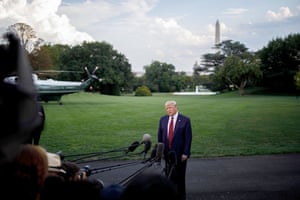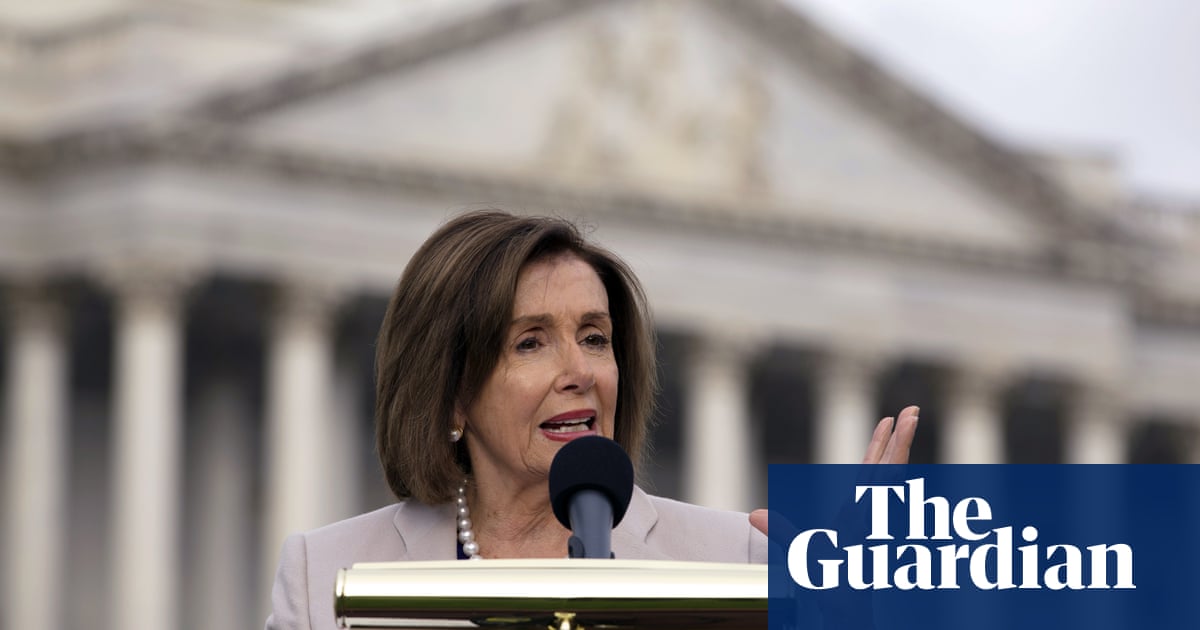For only the third time in the history of the modern presidency, the US House of Representatives was poised to vote on Thursday to formalize impeachment proceedings against the president of the United States.
The House speaker, Nancy Pelosi, has scheduled a morning press conference to announce the next stage in a process that seemed likely to lead to Donald Trump’s impeachment – if not necessarily his removal from office.
The vote on Thursday, which was expected to pass on party lines, would lay out a road map for impeachment that could produce televised public hearings within two weeks and a vote on impeachment itself by the end of the year.
Congressional investigators have been interviewing witnesses – 15 and counting – about alleged misconduct by Trump, who stands accused of using the power of his office to solicit foreign interference in the 2020 US election.
Trump has denied the charges, claiming that a July phone call in which he asked Ukrainian president Volodymyr Zelenskiy for a political “favor”, as captured in a partial transcript released by the White House and backed up by witness testimony, was “perfect”.
The desired favor, as Trump himself explained in the call, was for Ukraine to investigate a company that had employed a son of Joe Biden, whom Trump saw as a top political threat. Trump also wanted an investigation that would cast doubt on Russian tampering in the 2016 US election.
At the time, the White House had suspended almost $400m in military aid for Ukraine appropriated by Congress, and US diplomats had advised Ukrainian officials that a White House visit for Zelenskiy was contingent on the announcement of investigations.

If Trump is impeached, a Senate trial would follow, possibly early next year, with a two-thirds majority vote required to remove Trump from office.
“We’ve learned so much about Trump’s months-long campaign to pressure Ukraine because military veterans & his own national security aides stood up to tell the truth,” Pelosi tweeted on Wednesday. “They put their country ahead of everything else. It’s not too late for Republicans in Congress to do the same.”
Even as the House vote was taken, the parade of witnesses was scheduled to continue on Thursday, with the testimony of Tim Morrison, a senior national security council official described in previous testimony as having a “sinking feeling” about the negotiations he witnessed between Trump proxies and the Ukrainians.
In a surprise move that had Washington atwitter Wednesday night, Morrison announced that he was resigning from his White House post. While he had planned to testify anyway, Morrison’s resignation freed him absolutely from a blanket White House order that officials not participate in the impeachment inquiry.
Still in question was whether Morrison’s former boss, the then national security adviser John Bolton, who reportedly described the back-room Trump-Ukraine haggling as a “drug deal” that he wanted no part of, would testify before congress.
A lawyer for Bolton told Congress on Wednesday that while Bolton would not testify without a subpoena, the lawyer stood ready to receive a subpoena.
Testimony by Bolton, a Yale-educated lawyer, blistering conservative hawk and expert bureaucratic infighter, could be as damaging for Trump as any so far. Bolton reportedly told aides that Rudy Giuliani, Trump’s personal emissary in the Ukraine saga, was a “hand grenade” that could blow everyone up, and he encouraged multiple aides to take their concerns about Trump’s Ukraine dealings to the top lawyer on the national security council.

That lawyer, John Eisenberg, has also been invited to testify next week before congressional investigators.
The House vote on Thursday would implement a procedure likely to lead to the drafting of articles of impeachment against Trump in the judiciary committee. Analysts have said that Trump is vulnerable to impeachment for abuse of power, obstruction of justice and contempt of Congress, charges familiar from previous impeachment proceedings against presidents Richard Nixon, who resigned, and Bill Clinton, who was impeached but not removed from office.
The procedure allows for Republicans to request witnesses and documents and provides for the presence of lawyers representing Trump at judiciary committee proceedings.
Before that stage, however, dramatic public hearings would play out before the intelligence committee, chaired by Adam Schiff of California, who has been spearheading the impeachment inquiry.
Schiff would call witnesses who previously testified in closed-door depositions before investigators, with an eye on presenting to the public the strongest case against Trump. Many Americans who have not been following the twists and turns of the closed-door testimony would be hearing the allegations against Trump – and meeting the witnesses, who include senior officials in the White House, state department, and Pentagon – for the first time.
“Trump has urged Republicans to focus on the substance in the impeachment inquiry, not the process,” Schiff tweeted on Wednesday. “I can confirm our focus will continue to be on the President’s own words and misconduct.
“Glad we all agree.”
